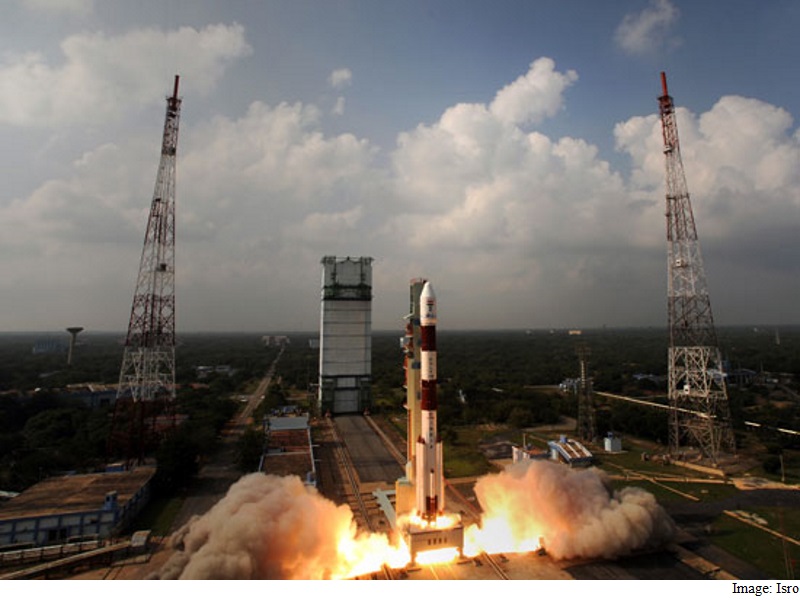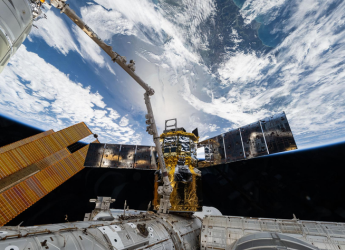- Home
- Science
- Science News
- Isro to Test Plane Shaped Reusable Space Launch Vehicle
Isro to Test Plane-Shaped Reusable Space Launch Vehicle

"We will test a small aeroplane-shaped vehicle - reusable launch vehicle technology demonstrator - weighing around 1.7 tonnes soon. The vehicle will travel up to 70 km and will return," K. Sivan, director, Vikram Sarabhai Space Centre, part of Isro told IANS in Sriharikota.
Currently, the cost of placing 1kg of object in space is about Rs. 3 lakh ($5,000) which scientists are hoping can be brought down to about Rs. 30,000 ($500).
(Also see: Isro Successfully Launches Sixth Navigational Satellite)
He also said that Isro will be flying its heaviest rocket Geosynchronous Satellite Launch Vehicle-Mark III (GSLV-Mk III) powered by its own cryogenic engine.
"The rocket's carrying-capacity will be between 3.2-3.4 tonnes. It will carry the GSAT 19 communication satellite," Sivan added.
Apart from these, Isro has also lined up a series of other launches.
"Next month, the seventh navigation satellite-IRNSS-1G will be launched. This will be followed by the launch of India's Cartosat-cartography satellite - and a couple of small satellites in May. The two launches will be done using the PSLV (polar satellite launch vehicle) rockets," P. Kunhikrishnan, director, Satish Dhawan Space Centre told IANS.
"In August, communication satellite INSAT-3DR will be launched using GSLV (GSLV Mark II version)," Kunhikrishnan added.
For details of the latest launches and news from Samsung, Xiaomi, Realme, OnePlus, Oppo and other companies at the Mobile World Congress in Barcelona, visit our MWC 2026 hub.
Related Stories
- Samsung Galaxy Unpacked 2026
- iPhone 17 Pro Max
- ChatGPT
- iOS 26
- Laptop Under 50000
- Smartwatch Under 10000
- Apple Vision Pro
- Oneplus 12
- OnePlus Nord CE 3 Lite 5G
- iPhone 13
- Xiaomi 14 Pro
- Oppo Find N3
- Tecno Spark Go (2023)
- Realme V30
- Best Phones Under 25000
- Samsung Galaxy S24 Series
- Cryptocurrency
- iQoo 12
- Samsung Galaxy S24 Ultra
- Giottus
- Samsung Galaxy Z Flip 5
- Apple 'Scary Fast'
- Housefull 5
- GoPro Hero 12 Black Review
- Invincible Season 2
- JioGlass
- HD Ready TV
- Latest Mobile Phones
- Compare Phones
- Nothing Phone 4a Pro
- Infinix Note 60 Ultra
- Nothing Phone 4a
- Honor 600 Lite
- Nubia Neo 5 GT
- Realme Narzo Power 5G
- Vivo X300 FE
- Tecno Pop X
- MacBook Neo
- MacBook Pro 16-Inch (M5 Max, 2026)
- Tecno Megapad 2
- Apple iPad Air 13-Inch (2026) Wi-Fi + Cellular
- Tecno Watch GT 1S
- Huawei Watch GT Runner 2
- Xiaomi QLED TV X Pro 75
- Haier H5E Series
- Asus ROG Ally
- Nintendo Switch Lite
- Haier 1.6 Ton 5 Star Inverter Split AC (HSU19G-MZAID5BN-INV)
- Haier 1.6 Ton 5 Star Inverter Split AC (HSU19G-MZAIM5BN-INV)

















